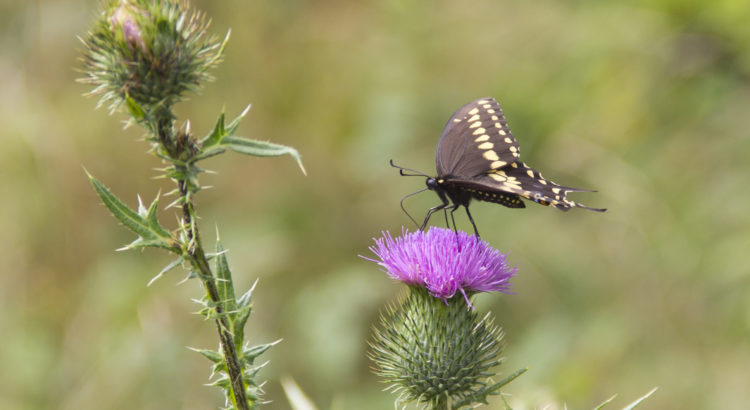By: Haley Doty, Visitor Services and Interpretive Ranger at Franconia Notch State Park
Summer is officially here in New Hampshire State Parks and with it comes outdoor adventures, fun at the beach, ice cream and insects. Although most people dread the arrival of our six-legged friends, I look forward to it! Their vast diversity as well as the benefits they provide to humans have always intrigued me. I hope that after learning more about some of our native New Hampshire insects, you will too!
What is an Insect?
Contrary to popular belief, not all creepy crawlies are insects. In order to be classified as an insect, an organism must meet the following criteria: have three body segments (a head, thorax and abdomen), three pairs of jointed legs, a pair of antennae and an exoskeleton.

Based on this definition of an insect, we now know that ticks, centipedes, millipedes, spiders, mites and many more are not actually insects. I feel like insects have a bad reputation due to mosquitoes and black flies without having to include these impostors, wouldn’t you agree? Next time you find yourself atop a kitchen table with newspaper in hand, try to see if your unwanted visitor meets the requirements necessary to be an insect. The answer might surprise you!
New Hampshire Insects

This beautiful butterfly is a New Hampshire native and pollinator. By transferring pollen between flowers while feeding, this butterfly is responsible for the continued spread and development of blue lupine. Unfortunately, Karner Blues are currently both state and federally endangered. Their refined palette requires that they only use blue lupine as a source of food and egg laying locations. You can help this species and others by planting native flowers in your garden!

As suggested by its feline namesake, the Appalachian Tiger Beetle is a fierce predator. As adults, they are known for pouncing on their prey and being able to run very fast. As larvae, they create burrows in the ground and use them to ambush insects passing by. These beetles are found along rocky rivers and streams where they have space to chase and ambush prey. Those who don’t generally like insects should love these because they control insect populations in their area.

The Ringed Emerald dragonfly can be found near lakes, ponds and slow moving streams throughout New Hampshire. These predatory insects are like heat seeking missiles when chasing their prey. They patrol over open water searching for other flying insects including mosquitoes, flies, small moths and flying ants. Using their amazing eyesight and speed, these insects are able to catch their prey mid air! Next time you are on the water, be sure to look out for the Ringed Emerald and the 159 other species of dragonfly that live in New Hampshire!
Although I only highlighted three insects in this post, there are thousands within New Hampshire that provide valuable services such as pollination and pest control. Help protect these insects by learning more and protecting their environment. If you happen to be in Franconia Notch State Park, stop by the Hiker’s Cabin where you can find me teaching about interesting insects and more!

